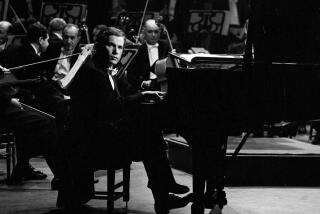AFTER 8 YEARS, EMIGRATION IS MUSIC TO HIS EARS
- Share via
MOSCOW — For concert pianist Vladimir Feltsman, being forbidden to perform in public was like being in prison or in exile.
Now, after eight years of virtual banishment by the Soviet musical Establishment, the Jewish “refusenik” has been given permission to emigrate and to resume what once was a promising career as a piano virtuoso.
Feltsman, 35, who is to leave the Soviet Union today, has been assured of a university teaching post in the United States, and he has been invited to perform in several Western European cities.
As a professor at the State University of New York in New Paltz, about 80 miles north of New York City, he expects to earn more money in a year than he did in 20 years as a performer in the Soviet Union. He was once paid 83 rubles (about $130) for a sold-out concert in one of Moscow’s leading auditoriums.
He has arranged to rent a house in New Paltz that will be a far cry from his cramped apartment over a music store on Moscow’s bustling Garden Ring Road.
And he can afford to think about renting a small apartment in Manhattan as well.
Still, he is not pleased by the prospect of leaving his parents behind, and he says he will miss the enthusiastic audiences he once attracted in the Soviet Union.
“I love to play here,” he said. “Moscow and Leningrad have the best audiences in the world.”
Feltsman asked Soviet leader Mikhail S. Gorbachev to let him retain his Soviet citizenship so that he might return for visits, but the request was ignored. He does not know when, if ever, he can come back.
“It’s very stupid that people like me have to leave this country,” he said. “It’s not moral and it’s not nice. I never did anything to hurt my country, yet I have to leave, I have to leave.”
Feltsman said his reason for emigrating is simple--to obtain greater artistic and personal freedom.
“I don’t want to be a doll in some bureaucrat’s hands,” he said.
The son of a successful composer of popular songs and operettas, Feltsman won the top prize in a piano competition in Prague when he was 15. Four years later, he took the grand prize at the Marguerite Long competition in Paris and was acclaimed by French critics.
He studied at the Moscow State Conservatory, the training ground for most of the distinguished musicians in this country, and became a rising star of the concert hall. He played with the best orchestras and was described as “a pianist of extraordinarily vivid gifts” by Tikhon N. Khrennikov, first secretary of the Union of Composers.
After his marriage in 1977, he was allowed to tour in Japan and France, but his wife, Anna, had to remain at home. He made seven records on the Soviet label Melodiya, all of which have been issued in Europe, Japan and the United States.
Then, on a spring day in 1979, Feltsman disclosed that he wished to emigrate to Israel. Retaliation was instant. His records were banned by the state broadcasting system. A concert was canceled two hours before he was to play. His records were removed from music stores.
Except for a single performance in the Republic of Georgia, he did not appear in a major concert in the Soviet Union for eight years.
Former U.S. Ambassador Arthur Hartman and his wife, Donna, heard of Feltsman’s plight. They admired his playing and arranged for him to give regular recitals at Spaso House, the ambassador’s residence (CBS recorded one of these performances).
On one occasion some of the piano’s strings were severed just before Feltsman was to perform, but repairs were made and the performance began on schedule. When Feltsman deplored the vandalism as “absolutely unacceptable and barbaric,” Tass, the official Soviet news agency, accused him of being part of an anti-Soviet show.
Unexpectedly, he was asked last spring if he would perform at Tchaikovsky Hall, one of the largest in Moscow. He was given only 10 days’ notice, but he agreed, and dedicated the evening to people who, like himself, were barred from leaving the country.
The applause was thunderous, probably as much for Feltsman’s struggle as for the Schumann program he played.
“I am happy the public still remembers me,” he said at the time. “It’s a bitter joy when I recall all those empty years.”
A few months later, the Soviet authorities approved exit visas for Feltsman and his family.
“I am happy at leaving, and it’s painful at the same time,” he said. “We are full of plans, full of hopes . . . . I can only hope that after eight years of artificial stagnation, I will be able to express myself.”
Despite a flood of offers to perform, Feltsman said he will take his time about selecting a manager and scheduling appearances.
“We have no illusions that it will be a milk-and-honey life in the United States,” he said. “Absolutely not. There will be difficulties . . . . My main new feeling--and I really love it--is that I will be taking care of my family by myself. I’m making these decisions by myself . . . . I like this feeling, because here I cannot do it.”
More to Read
Sign up for Essential California
The most important California stories and recommendations in your inbox every morning.
You may occasionally receive promotional content from the Los Angeles Times.













